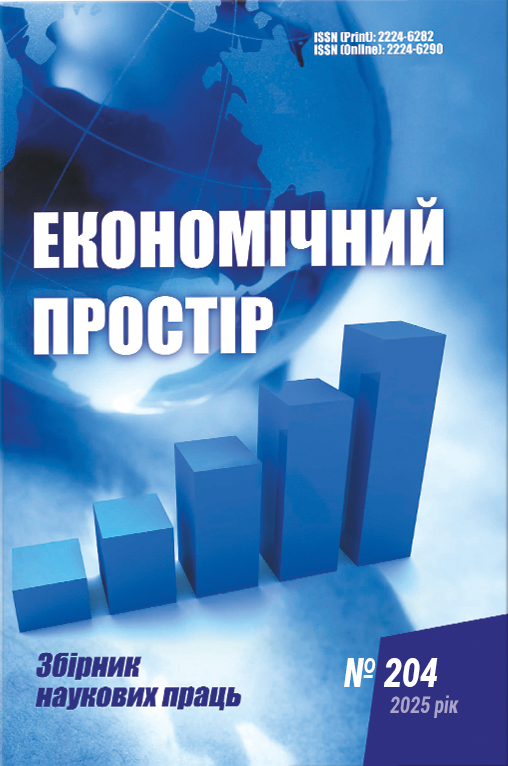РОЗВИТОК МЕТОДІВ ДОСЛІДЖЕННЯ В МАРКЕТИНГУ В УМОВАХ ФОРМУВАННЯ ПАРАДИГМИ ЦИФРОВОГО МАРКЕТИНГУ
DOI:
https://doi.org/10.30838/EP.204.101-109Ключові слова:
парадигма цифрового маркетингу, методи маркетингу як науки, обчислювальна соціальна наука, обчислювальні методи, маркетингові даніАнотація
Досліджено проблеми розробки й застосування методів збору й обробки маркетингових даних за допомогою сучасних обчислювальних методів / інструментів для вирішення теоретичних і методологічних питань у цифровому маркетингу. Проаналізовано передумови розвитку методології маркетингу як наукової сфери діяльності в умовах переходу до Індустрії 4.0. Розкрито сутність обчислювальної соціальної науки й проаналізовано причини її виникнення у контексті розвитку соціальних наук. Обґрунтовано доцільність застосування обчислювальних методів у маркетингових наукових дослідженнях для формування нової системи маркетингових наукових знань, відповідної сучасному рівню розвитку цифрового маркетингового середовища. Ідентифіковано переваги використання обчислювальних методів для розвитку цифрового маркетингу. Виявлено структурні зміни методологічної компоненти в процесі переходу до нової парадигми маркетингу.
Посилання
Achrol, R.S., & Kotler, P. (2011). Frontiers of the marketing paradigm in the third millennium. Journal of the Academy of Marketing Science, Vol. 40(1). Pp. 35-52. DOI: https://doi.org/10.1007/s11747-011-0255-4
Anderson, P.F. (1983). Marketing, scientific progress, and scientific method. Journal of Marketing, Vol. 47(4). Pp. 18-31.
Arndt, J. (1985). On making marketing science more scientific: role of orientations, paradigms, metaphors, and puzzle solving. Journal of Marketing. No. 49(3). Pp. 11-23.
Berente, N., Seidel, S., & Safadi, H. (2018). Research Commentary - Data-Driven computationally intensive theory development. Information Systems Research, Vol. 30(1). Pp. 50-64. URL: https://surl.li/efmkvx
Chang, R.M., Kauffman, R.J., & Kwon, Y. (2013). Understanding the Paradigm Shift to Computational Social Science in the Presence of Big Data. Decision Support Systems, Vol. 63. Pp. 67-80.
Chintagunta, P., Hanssens, D.M., & Hause,r J.R. (2016). Editorial-marketing science and Big Data. Marketing Science, Vol. 35(3). Pp. 341-342.
Deshpande, R. (1983). «Paradigms Lost»: On theory and method in research in marketing. Journal of Marketing, Vol. 47(4). Pp. 101-110.
Edelmann, A., Wolff, T., Montagne, D., & Bail, C.A. (2020). Computational social science and sociology. Annual Review of Sociology, Vol. 46(1). Pp. 61-81. DOI: https://doi.org/10.1146/annurev-soc-121919-054621
Huh, J., Nelson, M.R., & Russell, C.A. (2024). Introduction to computational advertising research methodology themed issue. Journal of Advertising, Vol. 53(5). Pp. 639-643. DOI: https://doi.org/10.1080/00913367.2024.2406187
İzmir, O. (2023). From marketing as a thought to marketing as a science: The scope, properties and methodology of marketing science. Sinop Üniversitesi Sosyal Bilimler Dergisi, Vol. 7(1). Pp. 536-569. DOI: https://doi.org/10.30561/sinopusd.1277571
Kuhn, T.S. (1996). The structure of scientific revolutions. 3rd ed. Chicago: The University of Chicago Press, 212 p.
Lazer, D., Pentland, A., Adamic, L., Aral, S., etc. (2009). Computational social science. Science, Vol. 323(5915). Pp. 721-723
Macy, M.W. (2024). Computational Social Science: a complex contagion. Translational systems sciences. Springer, Vol. 40. Pp. 53-64. DOI: https://doi.org/10.1007/978-981-99-9432-8_4
Reidenbach, R.E., & Robin, D.P. (1991). Epistemological structures in marketing: Paradigms, metaphors, and marketing ethics. Business Ethics Quarterly, Vol. 1(2). Pp. 185-200.
Rust, R.T., & Huang, M. (2014). The service revolution and the transformation of marketing science. Marketing Science, Vol. 33(2). Pp. 206-221.
Saura, J.R. (2020). Using data sciences in digital marketing: framework, methods, and performance metrics. Journal of Innovation & Knowledge, Vol. 6(2). Pp. 92-102. DOI: https://doi.org/10.1016/J.JIK.2020.08.001
Takikawa, H., & Fujihara, S. (2024). Methodological contributions of computational social science to sociology. Translational systems sciences. Springer, Pp. 23-51. DOI: https://doi.org/10.1007/978-981-99-9432-8_3
Theocharis, Y., & Jungherr, A. (2020). Computational social science and the study of political communication. Political Communication, Vol. 38(1-2). Pp. 1-22. URL: https://surl.lu/watzvs
Van Atteveldt, W., & Peng, T.Q. (2018). When communication meets computation: opportunities, challenges, and pitfalls in computational communication science. Communication Methods and Measures, Vol. 12(2-3). Pp. 81-92. DOI: https://doi.org/10.1080/19312458.2018.1458084

